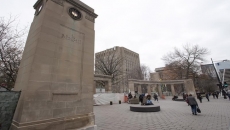A human rights adjudicator has ruled that the Manitoba government discriminated against a disabled Indigenous boy by not providing adequate health care.
The province has been ordered to pay the boy and his mother $42,500.
The case centres on Alfred (Dewey) Pruden, who was 16 years old when his human rights complaint was heard last year.
Pruden was born with a neurological disorder, is on the autism spectrum, and suffers from vision loss and poor motor skills.
The hearing was told the province provided some health care services, but denied others on the basis that the federal government is responsible for health care in First Nations communities.
Adjudicator Robert Dawson ruled Pruden did not get the care he needed, because of the jurisdictional divide between the federal and provincial governments.
"No government or other official intended to treat the complainants differently by reason of their ancestry as Anishinaabe people," Dawson wrote in his 20-page decision.
"However, that was the very effect of the whole of the assorted policies, practices, and even laws that try to carve out the concurrent jurisdiction of the federal and provincial governments in respect of health care and related services for First Nations people living in First Nations communities."
Dawson said the end result was that Pruden, who's a member of the Pinaymootang First Nation, 220 kilometres northwest of Winnipeg, received less help than a non-Indigenous person in his situation would have.
"Those intergovernmental arrangements caused health care and related services to be denied, delayed, or intermittently interrupted for the complainants. The same problems did not afflict neighbouring non-First Nations communities and those residents enjoyed health care and related services without denial, delay, or interruption."
The complainants had sought more money, including $200,000 in estimated future lost wages for the mother, who had changed jobs to have more time to care for her son. The adjudicator rejected that request.






